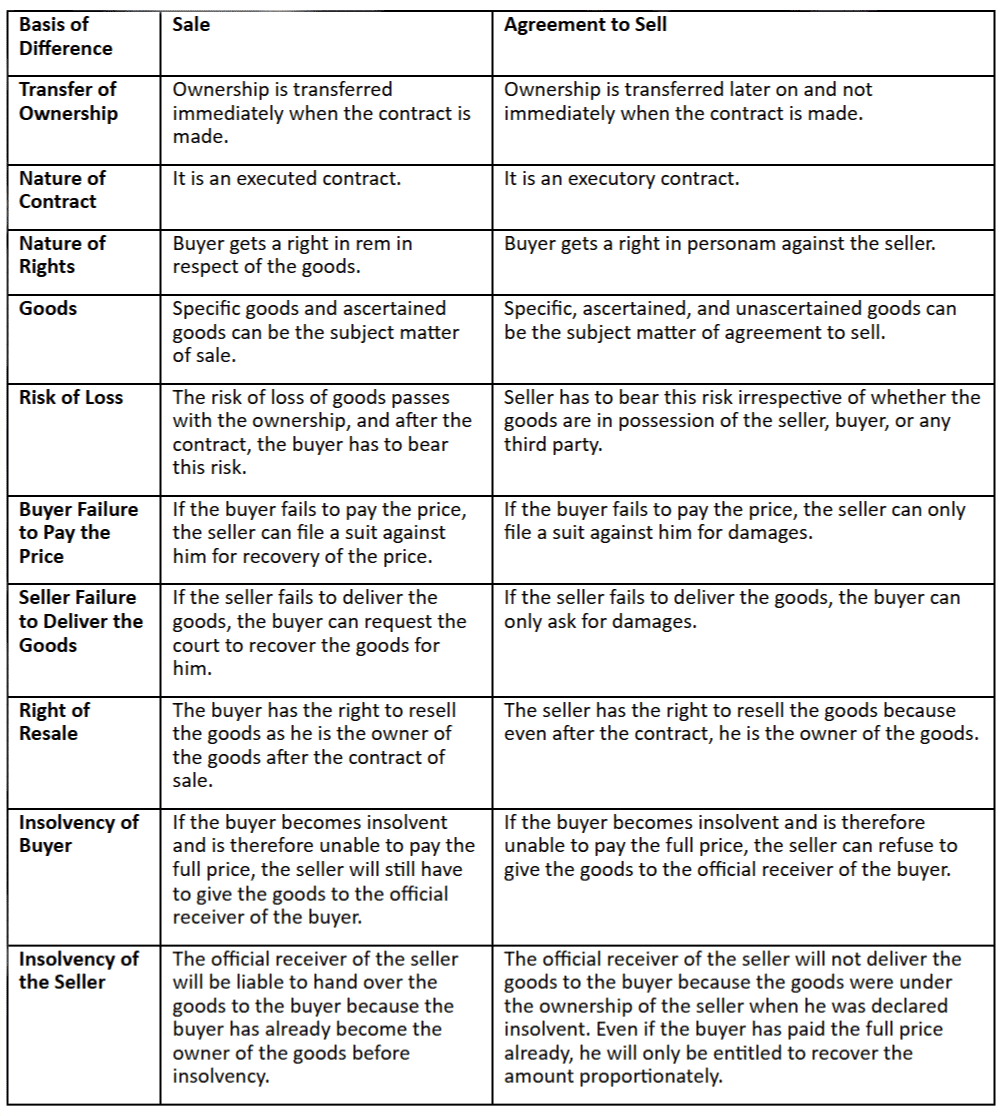Types of Goods - The Sale of Goods Act(1930) , Business Law | Business Law - B Com PDF Download
Meaning of Contract of Sale
- A contract of sale, as defined in section 4(1), is an agreement where the seller transfers or agrees to transfer the ownership of goods to the buyer for a price.
Key Elements of a Contract of Sale
1) Parties Involved:
- A contract of sale involves two parties: a seller and a buyer.
- It is not possible for a person to enter into a contract of sale with themselves.
2) Goods:
- Goods, under this act, refer only to movable items. Immovable property is not covered by this act.
- Shares, stocks, and debentures are considered goods under this act.
- Standing crops that are to be separated from the land before the contract is completed also qualify as goods.
- Intangible assets like goodwill, trademarks, and patents are included in the definition of goods.
- However, money and actionable claims do not fall under the category of goods. Money refers to currency in circulation, while old coins and currency are treated as goods.
3) Transfer of Ownership:
- The primary purpose of a contract of sale is to transfer ownership of goods from the seller to the buyer.
- If goods are handed over by one party to another for a different purpose and not with the intention of transferring ownership, it does not constitute a contract of sale.
4) Price:
- For a contract of sale, it is essential that the transfer of ownership is for a price.
- If ownership is transferred without consideration, it is a contract of gift, not a contract of sale.
- The price must be paid in money that is currently in circulation.
- If goods are exchanged for other goods, it is a barter contract, not a contract for sale.
- However, if goods are exchanged partly for goods and partly for money, it is a contract of sale.
Contract of Sale: Sale vs. Agreement to Sell

A contract of sale can take the form of either a sale or an agreement to sell, depending on when the ownership of goods is transferred.
- Sale: Sale occurs when ownership of the goods is transferred immediately from the seller to the buyer at the time the contract is made.
- Agreement to Sell: An agreement to sell happens when the seller promises to transfer ownership of the goods to the buyer at a later time, not at the moment of the contract.
Key Differences between Sale and Agreement to Sell

Types of Goods
Goods can be classified into the following categories:
- Existing Goods
- Future Goods
- Contingent Goods
Existing Goods: These are goods that physically exist and are owned by the seller at the time the contract of sale is made. Existing goods can be further classified into:
- Specific Goods: These are goods that are specifically identified at the time of forming the contract for sale. The contract is for these exact goods, and not for similar ones.
- Ascertained Goods: These are goods that are identified and agreed upon after the formation of the contract.
- Unascertained Goods: These are goods that are not identified and agreed upon at the time the contract is made.
Future Goods: These are goods that will be produced, manufactured, or acquired by the seller after the contract of sale is made.
Contingent Goods: These are goods whose acquisition depends on the happening or non-happening of a future event. For example, a contract to sell goods contingent on their safe arrival at the seller's destination.
Impact of Goods Perishing on Sales Contracts
- Specific Goods Perishing Before Contract: If a contract of sale involves specific goods that have already perished or been damaged before the contract, and the seller was unaware of this, the contract is considered void.
- Specific Goods Perishing After Agreement but Before Contract: If specific goods perish or are damaged without the fault of either party after the agreement to sell but before the contract of sale, the contract becomes void.
Price Determination in a Contract of Sale
- Mutual Consent: The price is typically agreed upon by both the buyer and seller.
- Course of Dealings: The price may be determined based on the historical transactions between the buyer and seller. For instance, if it’s established that goods will be sold at a 5% discount from the list price, the price will be set accordingly.
- Contract Provisions: The price can be fixed according to specific terms in the contract. For example, if the price is to be based on the prevailing rate at the time of delivery, that rate will apply.
- Reasonable Price: If the price is not determined by any of the above methods, the buyer is obligated to pay a reasonable price to the seller.
- Third-Party Price Fixing: If the contract stipulates that a third party will determine the price, their decision will be binding. If the third party refuses to set a price, the contract may become void. However, if the refusal is due to one party’s fault, the aggrieved party may seek damages. If the price is not fixed and the goods have been delivered or consumed, the buyer must pay a reasonable price.
Time Stipulations in a Contract for the Sale of Goods
- Time of Delivery: The stipulation regarding the time of delivery of goods is considered essential in a contract of sale. If the seller fails to deliver the goods to the buyer within the agreed timeframe, the buyer has the right to refuse acceptance of the goods.
- Time of Payment: The stipulation concerning the time of payment for the price is important but not essential in a contract of sale. If the buyer fails to make the payment on time, the contract remains valid. However, the seller can claim damages for the delayed payment.
|
30 videos|100 docs|17 tests
|
FAQs on Types of Goods - The Sale of Goods Act(1930) , Business Law - Business Law - B Com
| 1. What are the types of goods under the Sale of Goods Act(1930)? |  |
| 2. What is the difference between specific goods and generic goods under the Sale of Goods Act(1930)? |  |
| 3. Can the buyer reject the goods if they do not conform to the description under the Sale of Goods Act(1930)? |  |
| 4. What is the difference between merchantable and non-merchantable goods under the Sale of Goods Act(1930)? |  |
| 5. What happens if the buyer accepts the goods with defects under the Sale of Goods Act(1930)? |  |

















